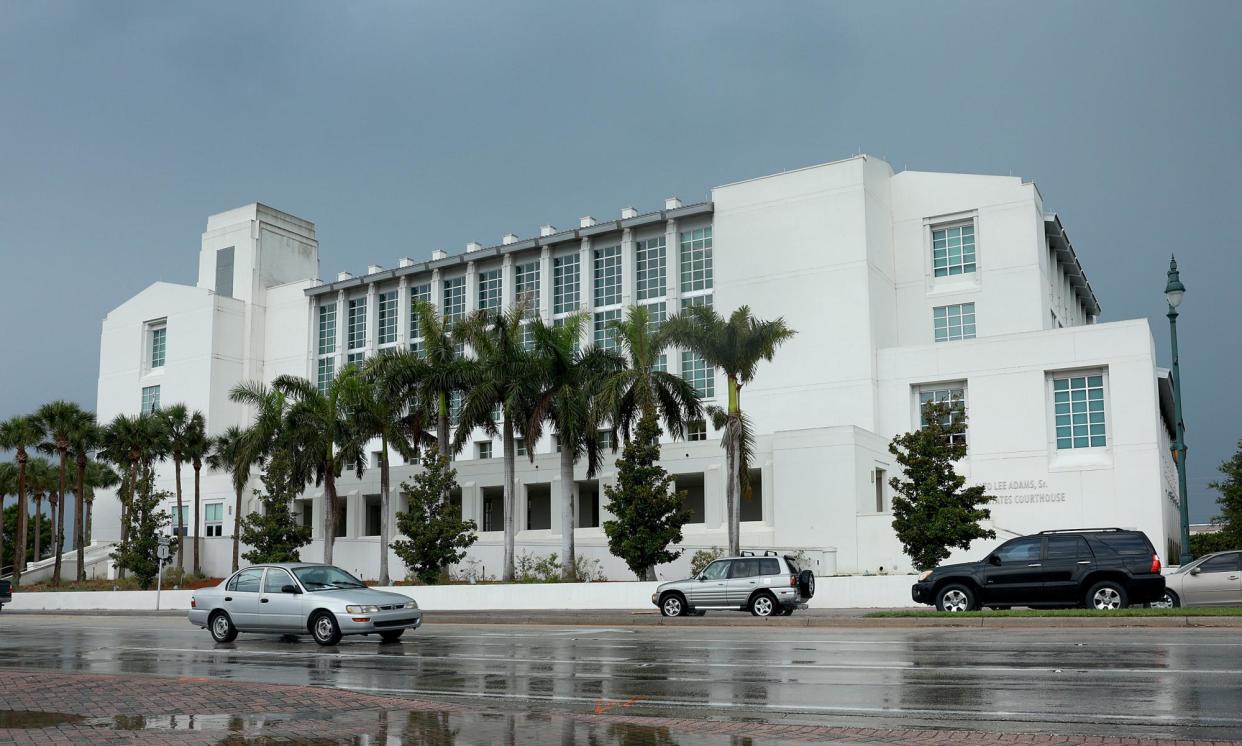Judge scolds classified files prosecutor asking to rein in Trump’s attacks on FBI

The federal judge overseeing Donald Trump’s prosecution for retaining classified documents expressed deep reservations on Monday with modifying the former president’s bail conditions to prevent him from making statements that could endanger FBI agents, suggesting redacting their names in filings was enough.
Trump-appointed US district judge Aileen Cannon also repeatedly admonished David Harbach, the prosecutor arguing on behalf of the special counsel, saying at one point she did not appreciate his tone and suggesting if he could not check his frustration, another prosecutor on the team could make arguments instead.
Related: Trump to ask judge to toss out lawyer notes in Mar-a-Lago documents case
The hearing in federal district court in Fort Pierce, Florida, was a particularly bruising day for prosecutors as the judge expressed skepticism at needing to change Trump’s bail conditions at this juncture – and then questioned the strength of their evidence.
The latest dispute over Trump’s inflammatory statements stems from his blatantly false characterization of the FBI’s lethal force policy when they executed a court-authorized search warrant at the Mar-a-Lago club in August 2022 and retrieved more than 100 classified documents.
The order, which limits FBI agents to use deadly force only if they face extreme danger and became public after the FBI’s operational plan for the search was unsealed, used standard language that is routinely used in hundreds of warrants executed across the country.
But Trump and some allies twisted the limiting language to claim the FBI was authorized by the Biden administration to shoot him when they searched Mar-a-Lago, even though Trump was not there during the search and the language is standard US justice department policy.
“Crooked Joe Biden’s DOJ, in their Illegal and UnConstitutional Raid of Mar-a-Lago, AUTHORIZED THE FBI TO USE DEADLY (LETHAL) FORCE. NOW WE KNOW, FOR SURE, THAT JOE BIDEN IS A SERIOUS THREAT TO DEMOCRACY. HE IS MENTALLY UNFIT TO HOLD OFFICE – 25TH AMENDMENT!” Trump wrote in a social media post last month.
The post raised hackles inside the special counsel’s office, and prosecutors last month asked Cannon to revise Trump’s bail conditions to prohibit him from making any public comments “that pose a significant, imminent and foreseeable danger to law enforcement agents participating in the investigation”.
The request – the first time prosecutors have sought to limit Trump’s public remarks in this case – was notable as it would dramatically raise the stakes for Trump. Unlike in his other cases where prosecutors sought gag orders, a violation of release conditions carries a risk of jail.
The judge, who did not rule from the bench in her typical practice, appeared unimpressed with prosecutors’ argument.
Cannon questioned why her order to redact witness identities in court filings were not enough to protect the FBI agents involved in the case, noting that she could not see anything in Trump’s post that amounted to a call to action or incitement of violence.
Harbach responded that redactions were insufficient because their identities would become public at trial, but Cannon immediately shot back, asking why it was necessary to proactively change Trump’s bail conditions at this juncture – as opposed to taking some other gagging action at trial.
Cannon also questioned why prosecutors had not found any threats that came directly as a result of Trump’s post.
Harbach responded that the record showed some of Trump’s supporters have acted on his grievances and threats were a regular occurrence in Trump’s other cases. Cannon was not satisfied with his answer, reprimanding him to be specific to the documents case and the exhibits prosecutors had presented.
“In this case, I have 11 exhibits,” Cannon said. “Are you suggesting I pull facts from other cases? Because that’s not going to happen. Attach them on exhibits and I’ll review them one by one.”
And Cannon pulled up Harbach on his contention that she did not have to weigh any first amendment concerns in assessing whether to modify Trump’s bail conditions because under the Bail Reform Act, judges have the power to pre-emptively safeguard the proceedings and the community.
The lack of a direct link from Trump’s posts leading to his supporters’ actions has long been point of contention for the judge, who pulled up prosecutors on the matter when they sought in an earlier motion to force Trump to redact the identities of people involved in the investigation.
That has been the case despite prosecutors reminding Cannon that a man tried to shoot his way into an FBI office in Ohio just days after the Mar-a-Lago search, saying “patriots” should head to Florida to defend Trump and kill FBI agents.
But Trump’s lawyers in their 20-page response seized upon Cannon’s issue with the causation, arguing prosecutors had failed to point to a single example of an agent working on the documents case who has faced threats because of Trump’s inflammatory statements.
“President Trump and the defense are similarly unaware of any hostility, harassment or risk of harm directed at any agent involved in this case based on President Trump’s statements,” the Trump lawyers wrote.


